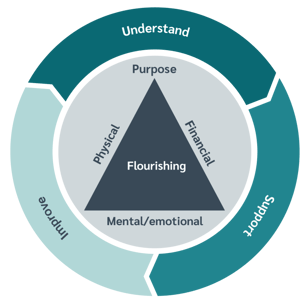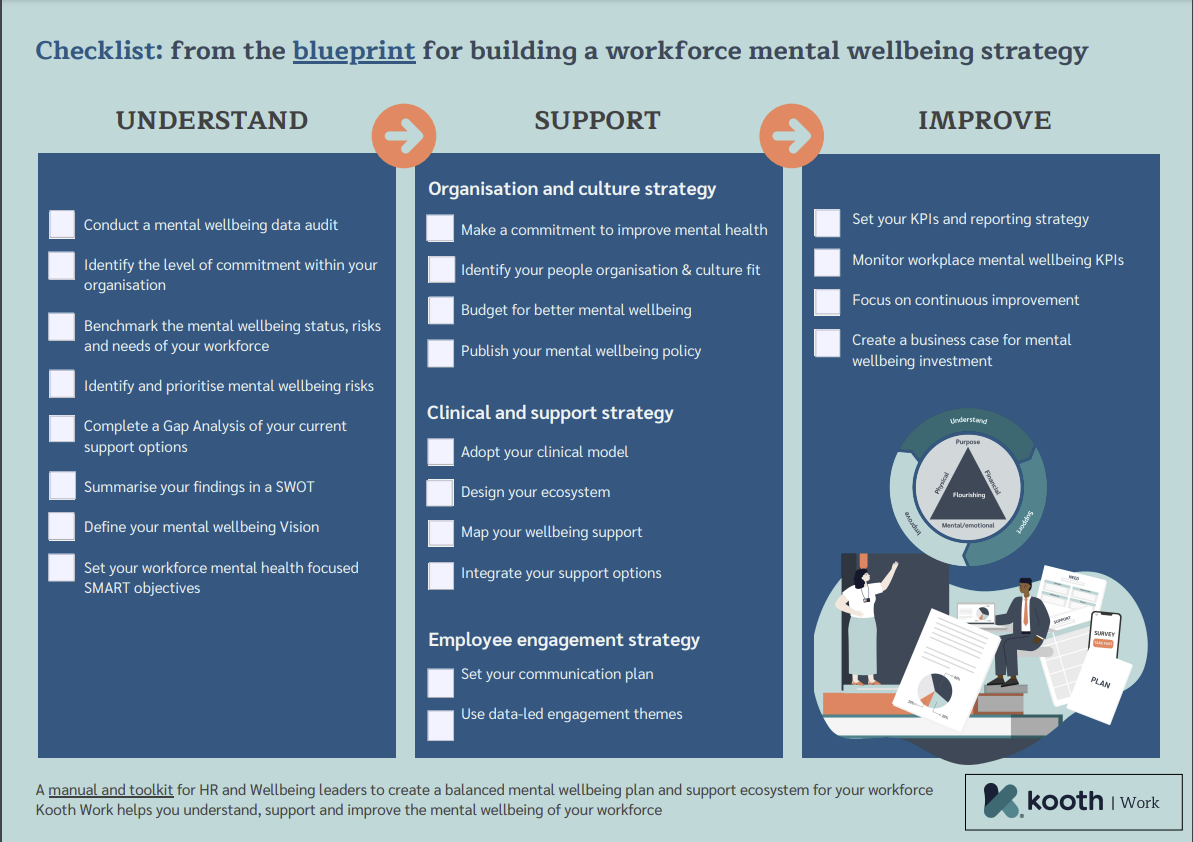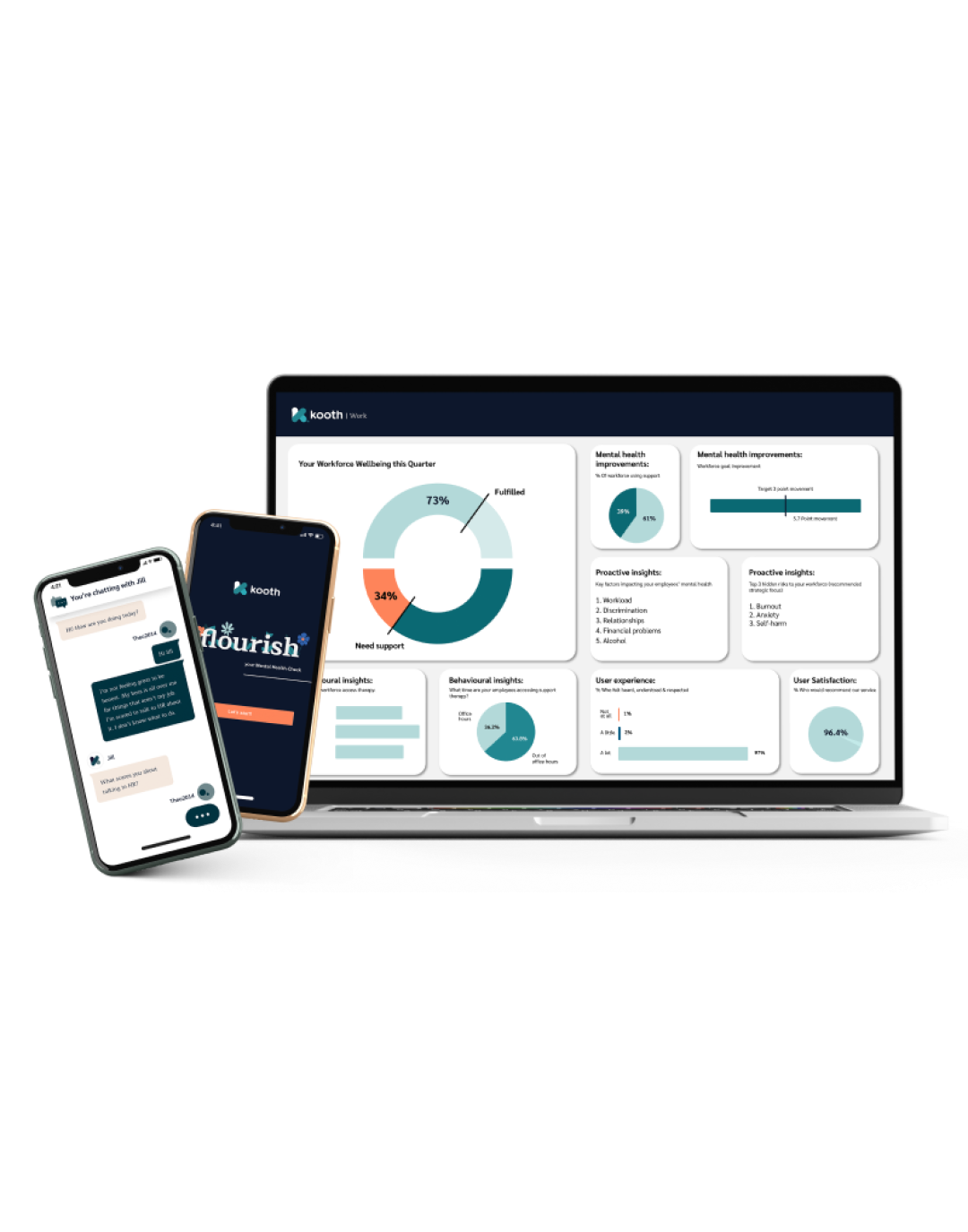Using a Framework Toolkit
Our Kooth Work Flourish research report found that one in every three employees doesn’t feel their workplace supports their needs, while 42% of employees are underserved by their employer support options. In our experience, this is usually down to organisations implementing wellbeing support measures ‘in the dark’.
When you don’t know what the current challenges amongst your workforce are, or what your people actually need, you’re never going to develop an effective strategy that promotes a state of flourishing mental health at work. But with a structured framework toolkit, it’s easy to identify what those next steps should be.

Four ways a framework toolkit for mental wellbeing can help to re-balance your employee mental wellbeing support options
Here are four ways a framework toolkit for mental wellbeing can help:
1. Benchmarking
If you don’t know where you are, you can’t figure out where you’re going. A data audit tool, used as part of a mental wellbeing framework, can help you to build a clear understanding of the current status of mental wellbeing in your organisation, identify the need for action, and assess the capability you have to address any challenges.
Benchmarking the mental wellbeing of your workforce is a critical part of your data gathering. You need to understand the mental health status of your workforce. You also need visibility of the hidden risks that will affect their mental wellbeing in the coming months and to measure how effective your current support options are. Kooth Work’s Flourish benchmarking tool helps you achieve this.
It is also important to evaluate the support options available, especially in the area of digital support options. With a myriad of choices, it’s often difficult to differentiate between mindfulness apps, safe online communities, AI chatbots and clinical evidence-based options capable of supporting a broad range of needs. Whilst these may look similar on the surface, the clinical effectiveness and outcomes are going to be very different. Use Kooth Work’s free evaluation tool to compare and score different employee benefits, traditional and digital options.
2. Analysing risks and gaps
A crucial part of prevention is being able to identify mental wellbeing risks and prioritise the areas that you need to address first. Using a risk matrix as part of a framework toolkit can help you to identify, assess, and mitigate potential risks. Understanding and addressing these risks is essential for ensuring the ongoing mental wellbeing of your employees, while the data gathered can be used to build a compelling business case for investment and change.
3. Creating an ecosystem of support
In order to turn these insights into something that makes a difference, you need to use all of the data you’ve gathered to create an ecosystem of support options that fit the needs of your workforce. A framework toolkit can help you to map out this ecosystem in a way that speaks to your employees’ current pain points.
4. Setting KPIs and insights
A framework toolkit can help HR or wellbeing leaders to set relevant workplace mental wellbeing KPIs intended to keep your company on track. These KPIs should target the mental wellbeing risks you’ve identified and prioritised through the risk matrix, and fill any gaps that you identify through a gap analysis of your current support measures.
A comprehensive framework toolkit can help you to engage your employees in raising the profile of mental wellbeing in your organisation, encourage discussion, remove the stigma, and build awareness of the support you’ve made available.
Kooth’s Framework Toolkit is designed for HR and Wellbeing leaders
We’ve developed a practical 'how to' guide to help you formalise a mental wellbeing plan and tailor your support ecosystem to the specific needs of your workforce.
Written by leaders from HR, clinical, and workplace wellbeing, we provide the blueprint to better workforce mental health, helping you to:
- Adopt clinical and data-led mental wellbeing.
- Align support with culture and workforce needs.
- Implement effective prevention and digital options.
- Secure the investment and budget you need.
- Continually improve the mental health of your workforce and demonstrate ROI.
Download the free mental wellbeing focused Framework Toolkit.
Useful links
Kooth Work’s Flourish workforce mental wellbeing research report
Use this free evaluation tool to compare and score different employee benefits, traditional and digital options.
View the Framework Toolkit Checklist single-pager.
Read the accompanying article which looks at the benefits of a prevention strategy for workplace wellbeing.






